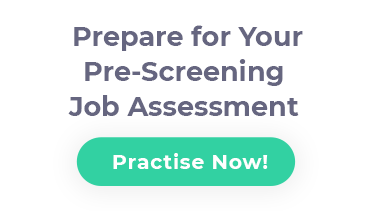McKinsey Online Assessment Test (SHL) Preparation – 2025

What Is McKinsey?
McKinsey is a global management firm with offices in over a hundred cities employing thirty thousand people. McKinsey works in dozens of industries and seeks professionals with the following qualities:
- Entrepreneurial Drive
- Leadership Abilities
- Personal Impact
- Problem-Solving Skills
- Leadership Abilities
They offer positions in an array of fields from coding to consulting, but the hiring process is extremely competitive.
What Is the Hiring Process at McKinsey?
McKinsey’s hiring process can get complex due to their mission to find the highest quality employees. The structure of their hiring process is identical for people across all fields with any level of experience. It includes these three stages:
- Application
- Aptitude Tests
- Final Interview
Application
The application is important because it’s the first impression McKinsey will have of you. They look for unique experiences that distinguish you from the crowd. Additionally, McKinsey favours versatility rather than specialisation.
Online Aptitude Tests
McKinsey administers multiple online aptitude tests after a candidate submits an application. They do this to reduce the size of the applicant pool before McKinsey extends an invitation to the interview stage. Online aptitude assessments offer the company an objective measure of the candidate’s intelligence and cognitive abilities. The assessments candidates must partake in include:
- Numerical Reasoning Exam
The numerical reasoning test is an eighteen-question assessment appraising the mathematical abilities of the candidate. The questions are structured around a table or graph with follow-up statements and questions. These statements and questions must be analysed and compared against the data for similarities and discrepancies. Candidates are allotted twenty-five-minutes to complete the assessment.
- McKinsey Problem-Solving Test
McKinsey created their own problem-solving aptitude test to ensure that candidates meet the company’s standards. The test looks like a combination of the verbal and numerical reasoning assessments with both small passages and empirical data mixed in together and independently. Following this information are one or more multiple-choice questions. In total, there are twenty-six questions that are all related to genuine McKinsey cases and the test takes up to an hour to finish.
- Verbal Reasoning Exam
The verbal reasoning assessment focuses on the candidate’s ability to evaluate written information. All of the passages of information will discuss foreign topics to highlight the capacity to comprehend novel concepts and ideas. Each passage is followed by three to five questions that feature three answer choices: “True”, “False”, and “Cannot Say”. Test takers will have nineteen minutes to complete thirty questions.
Final Interview
The final interview is a detailed piece of McKinsey’s hiring process. While it is one consecutive interview, it consists of three parts: expertise, experience, and problem-solving. Along with these features of the final interview, candidates will also receive case studies to review and interpret. The final interview is dedicated to the technical abilities of the candidate and their industry knowledge.
McKinsey provides common case studies on their company website as well as videos to help candidates prepare for their final interview. They can determine which candidates have watched or used these resources based on their performance during their interview. The interviewers make a note of this as it informs them of how a candidate will approach future meetings and projects.
How Are McKinsey’s Online Assessments Scored?
McKinsey provides candidates with three tests, but because two of them come from an outside source, they are not all graded the same. McKinsey’s Problem-Solving Test, or PST, is graded using established benchmarks from the past scores of McKinsey employees and interviewees. They have the choice to disclose your score to you after you take the assessment or during your interview.
The numerical and verbal reasoning tests are graded using norm groups and percentile scores. A norm group is similar to the McKinsey benchmarks; it’s a collection of scores from individuals in your field at your level of experience. The percentile score is the number produced after someone’s raw score is compared to their respective norm group. It tells the company that Candidate X, who’s percentile score is 82, performed better than 82% of the other candidates. For this reason, the percentile score is more important than the raw number of correct answers.
How to Prepare for McKinsey’s Online Assessments?
McKinsey’s online assessments may seem difficult considering the content and the time limits, however, they are conquerable with a little bit of preparation. Begin by reading over the descriptions of the assessments and decide how each play to your weaknesses and strengths. Then, focus on the ones that might emphasise an unfavourable quality, so you can improve this trait before the actual test.
Numerous resources have been made specifically for these tests. This allows you to choose which method works best for you and helps you put your best foot forward.
One popular method is the use of sample questions. They imitate the content on the test without the pressure of the ticking clock. Candidates can accustom themselves to the patterns of the questions before the test such as identifying underlying themes in data, evaluating arguments, and understanding the differences between groups of observations and evidence. Once you feel comfortable answering a handful of questions, you can start increasing the speed of your thought process.
Another effective method is the online practice tests. These mirror the testing atmosphere by providing candidates with identical questions and time constrictions. Candidates will have the opportunity to take the aptitude tests before the scores genuinely matter. You can practice working through problems both quickly and accurately. At the end of your first assessment, you will receive your initial scores, and these will help you gain an idea of how much more time you need to devote to your preparation.
Conclusion
Overall, McKinsey is looking for refined and well-prepared candidates during the interview process. Their employees represent the company and it is crucial to McKinsey that their people are always representing their values. Focusing on your work and emulating the company’s ideal professional is key to succeeding in their interview process. Best of luck!

